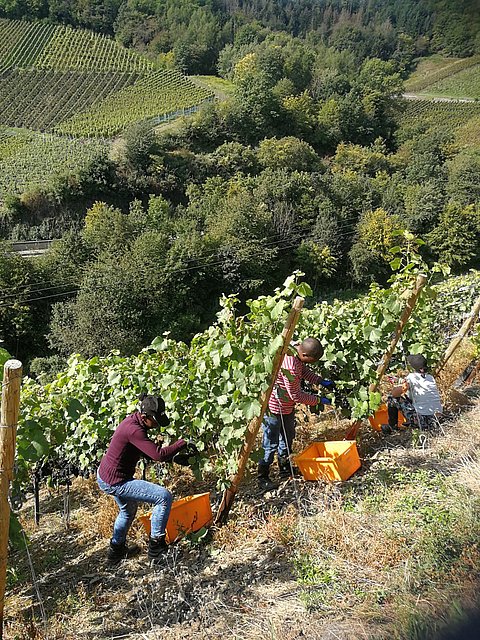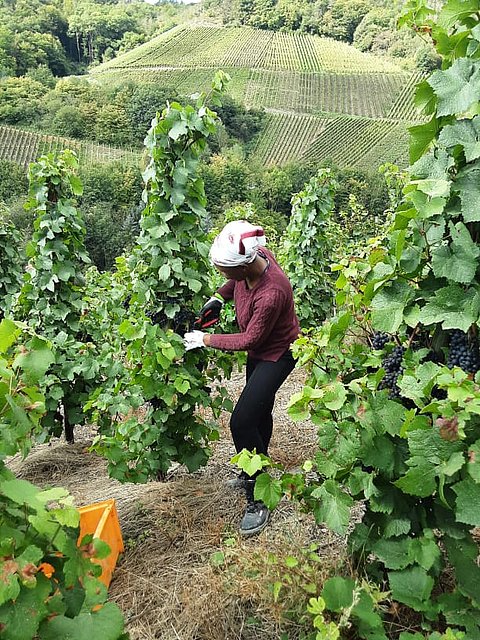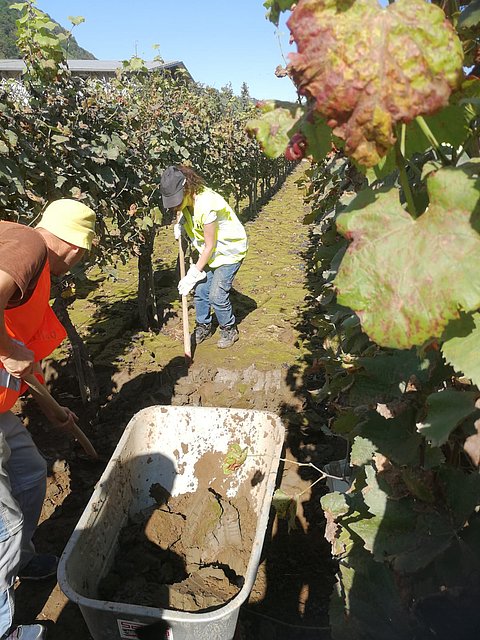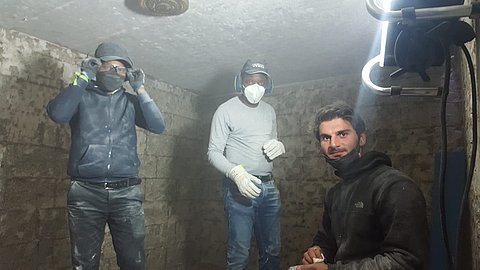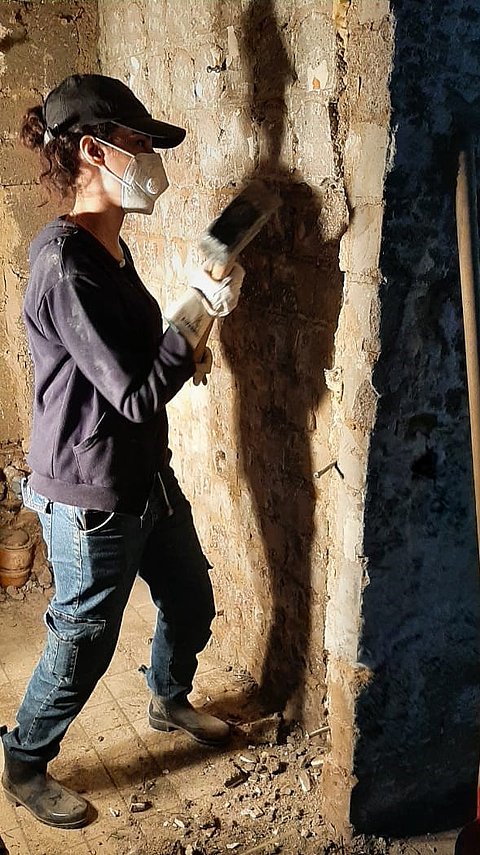Dr. Nora Kalbarczyk, Secretary General of KAAD, explained in her welcoming address the importance of concrete action and experience in KAAD’s educational program and encouraged the participants to intercultural encounters during their upcoming mission as well as to watch and listen. Dr. Marko Kuhn explained that this “exposure” was partly related to a subsequent KAAD seminar on agriculture and rural life. He gave an introduction to the structure and culture of the Ahr Valley and the effects of the devastating flood of 14th/15th July 2021. Practical advice for the group came from Ute Baumgart, who then travelled with the group to the “helpers’ camp”. She accompanied and coordinated the group during the five days and joined in their work.
Right from the start, the simple accommodation in the camp brought the KAAD group together with other helpers from different regions of Germany. It quickly became clear that it was the lack of labor force that mattered most, as accommodation, food, materials and equipment are made available from donations, private initiatives or public funds. In addition to the helpers’ camp, the “helpers’ shuttle” played an important role, as this initiative brings the voluntary workers to where they are needed every day, but also combines the availability of helpers with the need for help. As it tuned in well with the aforementioned KAAD agriculture seminar, the scholars, coordinated by Ms. Baumgart, spent most of the time in the vineyards of Dernau, where they helped a wine farmer affected by the flood with the grape harvest. It was impressive to see the huge number of vines on the steep slopes of the valley. The winemakers have largely lost their buildings and infrastructure and cannot afford to lose the 2021 harvest as well. The international helpers soon discovered that these steep slopes also pose an additional challenge during harvest.
In contrast to the work in the vineyards, a completely different activity was scheduled on one of the days: the gutting of a hotel in Bad-Neuenahr, which, like many other houses, was affected by the water and now had to be prepared for renovation. Here, the scholars exchanged the pruning shears for wheelbarrows, shovels, brooms, sledgehammers and electric hammer drills. Again, the 20 students were part of a larger group of helpers who could all look with content at the work done in the evening. On the last day, half of the group helped in a special way in viticulture: They were called to a wine-field next to the Ahr River, which is on the plain and, unlike the slopes, was flooded. With a lot of hard work, this field had to be cleared of the mud, which was getting harder and more compact and would have caused the vines to die off.
Working in community with many others, the usefulness of direct physical help and meeting the people affected made these days an experience that left a deep impression. In reflecting on their mission, the KAAD helpers noted that they first needed to see the situation in order to understand how great the need and destruction is on site. The church of St. Johannes in Dernau became a much-frequented place to go in order to process in silence and prayer what the participants had seen and experienced.
Serina Al-Massu, Palästina:
„Coming from a country with a history full of death and destruction, I wasn’t expecting to see something that could shock me before I travelled to the Ahr Valley. Neither was I expecting that this experience would change me so much, as I grew up in a situation of war. As we moved from one place to another in the Ahr Valley, I was truly shocked by the amount of damage nature can do. We got engaged with the work and merged with the people there, talking to the citizens of the destroyed villages, hearing their stories of that night. We saw pictures of the different places before the disaster and pictures of their loved ones who died in the flood. My attitude of “I have seen worse“ broke down in the sight of this catastrophe. I thought a lot about how these peaceful people got so much injured mentally and physically through something that they could not control or prevent. I had expected only depressed people but what I found was motivated spirits wanting to restore what was lost and even improve part of the villages. It appears as if they are preparing for a re-birth from death.
I thank our great lord for being able to experience and see this right before I get started with my studies. It strengthens me to stand again obstacles I will have to face and to take the people of the Ahrtal as an example. It can be a reflection of my country’s situation, and the hard work I should do as a contribution to my country’s own re-birth.“
Phidelis Nasimiyu, Kenia:
„My time at the Ahr Valley turned out to be one of the most a special and unique experiences I ever had. One thing I learned was that in this humanitarian setup, it is easy to get material support but the most demanding support needed is human labour. I am grateful for the opportunity to have been one of the thousands of volunteers helping those affected by the flood. As the KAAD family, we were unique, from our international diversity to the flexibility to do demanding and tough work (‘Nur die Harten kommen in den Garten’). While doing the work I also learned new techniques and acquired new skills. On the ground, the most difficult thing was to realize how much damage the floods left behind. In one of my conversations in Bad Neuenahr one person said to me, “I miss our old town, I believe with the help I see around one day we will have it up again. I don’t know how long that will take but I also know that the town will never be the same”. The grape farm slopes were steep, and the drilling left my muscles with the aches but the joy of knowing that my help and our help counts, kept the fire burning. The Ahr community is in my prayers every day and I hope to visit the area again. I am grateful to the KAAD Team for the opportunity, their coordination and presence on the ground. This chance has made me appreciate many things in my life that I took for granted.“
Gordon Dakuu, Ghana:
„I was humbled by the social support system and the number of people from all ages categories who travelled from very far and near to the Ahr Valley. They made a sacrifice of their comfort and jobs both within weekends and weekdays in order to support flood victims in various ways. This changed my perceptions about the Germans and their social fabrics. This experience reminded my how valuable it is to strive to live for people in every way possible. A big lesson for me was how social and moral values could be tapped even in disaster situations of this kind not distinguishing race, language, or religion.
I was surprised at the reception and acceptance I received from the German community. Those who were also out there to offer their support to the flood victims were in solidarity with us who hail from far away countries. Together we worked for reconstruction and salvaging the produce of the Ahrtal wine farmers.“
Fidel Delos Reyes, Philippinen:
„My time helping the farmers in the Ahr valley was an enriching and insightful experience for the mind, body and soul. We could help in grape harvesting, soil cleaning and construction, but we also learned a lot since the farmers shared their knowledge about agriculture and farm life. It made me realize that despite the mechanization in Germany, farmers still labour very hard to make a living. Bonding with them touched my heart and filled my spirit. It made me think about the situation back in my home country, the Philippines, where farmers toil with harsh weather, outdated equipment and drastically lower pay.“
Mena Shenouda, Ägypten:
„It’s been the best moments I experienced since I arrived in Germany. I was very impressed by the big number of people in the camp, especially those who were not young any more. All did their best to help in all possible ways! Our KAAD team was awesome. We had many hard-workers, truly helpful and funny as well. I met many of them in person for the first time and we bonded in these days. If there is any other opportunity like this to give a hand or help, I will definitely go for it.“
Fransisca Hapsari, Indonesien:
„Ich werde diese Erfahrungen für immer schätzen. Es hat mich gestärkt, als KAAD-Stipendiatin nicht nur Unterstützung von Deutschland zu bekommen, sondern auch Hilfe geben zu können. Es war wunderbar, in unserer eigenen Gruppe mit so vielen Leuten zusammenzuarbeiten und auch zu sehen, dass die Leute im Helfer-Camp überall versuchen, unsere „bunte“ Gruppe zu unterstützen. Die Begleitung durch den KAAD war super und hat es uns möglich gemacht, im Ahrtal die beste Seite des Menschen zu sehen, sogar nach einer schrecklichen Katastrophe. Es wäre schön, wenn so ein ehrenamtlicher Einsatz jedes Jahr für uns angeboten werden könnte. Wir haben gelernt, wie wichtig Solidarität und freiwillige Arbeit für die Gesellschaft sind.“
María Lucía Valle Vera, Peru:
„Die Arbeit im Ahrtal war für mich eine wertvolle Erfahrung. Ich finde es sehr positiv, dass der KAAD seinen Stipendiatinnen und Stipendiaten die Option bietet, die akademische Ausbildung, die wir an Universitäten und Instituten erhalten, durch einen sozialen Einsatz und konkrete Arbeit zu ergänzen. Für mich war das eine Möglichkeit, etwas an Deutschland zurück zu geben für den Empfang, den wir als ausländische Studierende erhalten. Ich bin sehr dankbar für die Solidarität und Großzügigkeit aller an der Arbeit Beteiligten. Außerdem war es eine gute Gelegenheit, um die deutsche Gesellschaft und ihre Menschen besser kennen zu lernen.“
Titus Kimani Githua, Kenia:
„Joining hundreds of volunteers in the Ahr Valley was a lifetime experience! I’ve never seen such love and dedication from so many people who constantly flocked this region to voluntarily help the flood victims. My heart was moved looking at the trail of damage that was left behind, ranging from collapsed houses, bridges, roads, railways wine fields etc. As an expert in the field of water resources management, the exposure in the Ahrtal confronted me with the real impact of floods and a dire need for disaster preparedness, flood control, management and protection. Lastly, I never thought I would one day be in vineyards and even harvest wine in the red wine paradise of Germany! It was interesting to climb the extremely steep slopes of the historical red wine farms, especially the Spätburgunder.“
Diana Bayu, Indonesien:
„Im Ahrtal helfen zu können, war für mich eine wirklich tolle Erfahrung. Da ich aus Indonesien komme, hätte ich nie erwartet, dass es in einem so modernen Land wie Deutschland zu solch schlimmen Überschwemmungen kommen kann. Ich wurde daran erinnert, wie stark die Natur ist und wie schwach wir Menschen sind. Außerdem habe ich ein Gefühl von Zusammengehörigkeit, Freundlichkeit und Menschlichkeit erlebt. Diese Erfahrung hat mir klar gemacht, dass ich nicht nur hier bin, um zu studieren, sondern auch, um als Mensch zu wachsen.“
Hagos Niguse, Äthiopien:
„Working in the Ahr valley was an amazing experience and at the same time, it was heartbreaking to see such a massive disaster. I worked in Ahr valley with all my passion and dedication so as to show the affected people that they are not alone and have my and our solidarity. Shannon L. Alder says that “one of the most important things you can do on this earth is to let people know they are not alone.”
I want to pass my sincere sympathy and support to those, who lost their loved ones as a result of this natural catastrophe, and I wish recovery and relief to all those affected!“
Marko Kuhn, KAAD:
„Für die KAAD-Gruppe von Helfern ist in diesen Tagen das Ahrtal zu einem Sehnsuchts-Ort geworden, trotz des Leids und der Zerstörung.
Ein Ort, an dem ihre Hilfe gebraucht und geschätzt wird – kommen sie doch aus Ländern, die häufig Hilfe aus Europa brauchen.
Ein Ort, an dem Solidarität (oder „Solidahrität“, wie im Ahrtal oft zu lesen ist) kein Schlagwort, sondern gelebte Realität ist.
Ein Ort, an dem sie zupacken können und an dem das Ende des Tages ein sehr konkretes Resultat sehen lässt.
Ein Ort an dem Jung und Alt, Deutsche oder Menschen anderer Herkunft am gleichen Ziel arbeiten: Wiederaufbau, Linderung von Not, Schaffen von neuer Hoffnung.
Nicht zuletzt ist das Ahrtal auch zu einem Ort geworden, an dem Menschen aus verschiedensten Nationen und Erdteilen untereinander zusammengewachsen sind. „Aufgeben ist keine Option“ steht in großen Buchstaben über die ganze Fassade eines Hauses in Dernau geschrieben – in den Weinbergen von Dernau haben sie daran gearbeitet, dass ein Winzer hoffentlich nicht aufgeben muss. Immer wieder haben sie betont, wie sehr es sie rührt, dass überall einfach nur „Danke!“ auf Mauern geschrieben steht, „Danke allen Helfern“ an Wänden gesprüht wurde. Sie konnten Menschen zuhören und einfach nur nicken, wenn sie vom Schrecken der Flut erzählten und davon, dass Kinder im Ahrtal jetzt Panik bekommen, wenn es draußen regnet. Die Gruppe hatte Glück, denn bestes Wetter begleitete die fünf Tage des Einsatzes im September und die mit Reben bewachsenen Hänge im Sonnenschein standen in starkem Kontrast zur Zerstörung direkt unten am Fluss. Kaum zu glauben, so war immer wieder zu hören, dass dieses friedliche Flüsslein, dass da in der Sonne dahinfließt, so viel Gewalt und Leid bringen konnte.“
